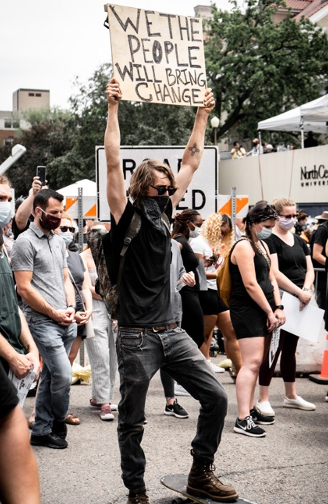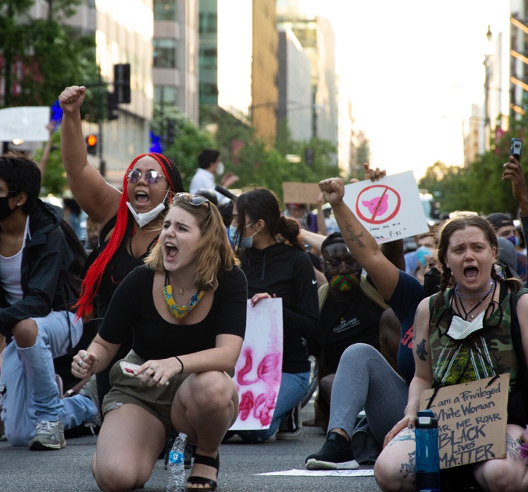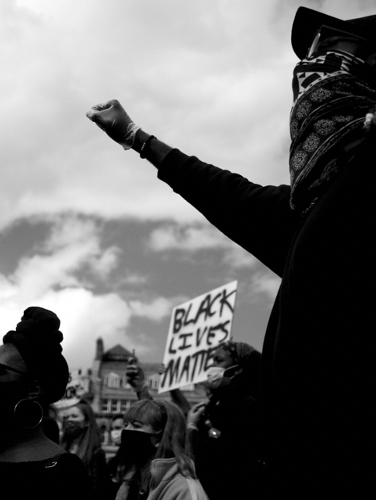The Perfect Storm: The Black Lives Matter Movement and Aging Generation Z in the US
As we hear over and over again, the future of our country and planet is in the hands of today’s youth. Many people worry that Generation Z (Gen Z) has too little political participation, excessive screen time, and a crippling social media addiction; however, that is not the full truth. The societal pressure to make changes is massive, and Gen Z is not backing down. Instead, they fight hard for what they believe in. The Black Lives Matter movement (BLM) is recognized as one of the largest social movements that the United States has seen. This contemporary social movement sets the stage for future social movements, all of which need to be addressed. With today’s youth driving this impactful movement, we see passion, bravery, and determination from this courageous group, proving to the rest of society that they will stand up for what they believe. There is a perfect storm of Gen Z growing into young adults while the social climate in the US is currently rocky, causing many companies to rethink how to target this group of consumers.
Who are the Gen Z’s?
It is important to understand the characteristics of Generation Z, who were born between 1995 and 2012 because of their massive impact to the nation. This generation is also known as the ‘digital natives’ because they are the first generation growing up with today’s advanced technologies. This digital lifestyle is why they play such a key role in this social movement and is also why the digitalization of America will affect many aspects of the US, such as corporations and current trends. For starters, Gen Z “will soon surpass Millennials as the most populous generations on Earth, consisting of one-third of the world’s population.” Generation Z is also known to be the most diverse generation in America, an attribute that has arguably made the generation more open-minded than those before it. They are known as the ‘Do-It-Yourself’ generation, who communicate in an informal, individual, and straightforward way. This generation is a catalyst for mass innovation, entrepreneurship and creativity. When referring to Gen Z’s sense of activism, Amanda Slavin, a researcher found that, “Generation Z wants to be heard irrespective of their young age”. This generation recognizes that even children, adolescents, and young adults have a voice and that there is no better time to use it. However, some of the downsides of this digitally-focused generation include higher rates of attention deficit disorder, higher dependencies on technology, and increased emphasis on material goods, and a sense of entitlement. The United States is witnessing a significant moment in history where Generation Z is becoming young adults in a tumultuous political and social climate and are willing to stand up to make impactful and necessary changes.
What is the Black Lives Matter Movement?
It is crucial to understand the recent timeline of the BLM movement occurring in the United States, but it is also important to understand the long history that led to it. Racism, police brutality, and systemic racism have been soiling our country for decades beginning with the slavery; today, these cruelties still exist. There is extensive history of police brutality in the United States, with countless deaths of innocent African Americans at the hands of police officers. Today (October 29, 2020), there is a reported 874 killings from police officers in the States, wherein total police killings, 28% of the victims were black, while black people only make up 13% of the total population. The probability of a black person being killed by a police officer rather than a white person is 3:1.
Similarly, systemic racism is so prominent in US society that it is deep-seated in everyday life. Institutions such as banks, schools, businesses, government agencies, and law enforcement all still have systemic racism present, which is an issue Gen Z is finally helping to address. Both systemic racism and police brutality are extreme injustices within society, and the recent viral video of the devastating death of George Floyd was the tipping point. It is important to recognize that there is an abundance of deaths of unarmed African Americans before and after George Floyd that were all examples of extreme police brutality and racism. George Floyd was a 46-year old black man who was purchasing a box of cigarettes at a local convenience store using a counterfeit $20 bill. Because of the racism present in society and the blind eye to police brutality, Floyd was pinned down for 8 minutes and 46 seconds until he took his last breath on May 25th, 2020. This injustice proceeded another horrendous death, that of Breonna Taylor. Taylor was a 26-year old woman who was shot at least 8 times in the ‘safety’ of her own home because police barged in for a crime unrelated to Taylor. The aftermath of these deaths included a wave of protests in 2,000 American cities, strengthening the already influential movement of BLM. It is important to understand that the US’s current political and social climate ignited many of these young protesters to not only participate in these marches, but also to make active changes in their lives ranging from learning more about systemic racism, where to shop, how to support black voices, and more.

Photo by munshots on Unsplash

Photo by Danny Lines on Unsplash

Photo by Sushil Nash on Unsplash
How Does This Affect Consumption and Marketing?
Generation Z is becoming the most influential generation yet and has shown its commitment to a better future through prioritizing social changes as seen in the BLM movement. The big question is how companies can alter their marketing strategies to not only attract this new group of consumers but also to respond to rising social issues in the United States. Gen Z no longer looks at companies solely based on their product and the product’s success, instead, they focus on the organization’s ethics, practices, and social impact. In Deloitte’s study on Gen Z, they found that as a group, Gen Z desires to work for companies “whose values align with their own, with 77% of respondents saying that it’s important.” Companies need to constantly prove that they are making efforts as moral global citizens. This generation does not only want strong corporate social responsibility, but they want efficiency and transparency when it comes to company’s communication of business strategy. A company’s ethics and values need to be front and center for Generation Z to respect, increasing brand loyalty. We have seen companies respond to the BLM movement in many ways, not only in showing their support of the extremely important movement but also to align with what Generation Z looks for in companies. For example, Adidas has committed to filling 30% of new positions with Black or Latinx workers, while PayPal is committing to supporting Black-owned and minority-owned business in the US. We are not only seeing a generational shift in conjunction with a massive social movement, but we are seeing how this is impacting companies’ strategies. This shift is forcing companies to increase their awareness of social impact, making their strategies more transparent, powerful, and outspoken. This will help companies to make changes at the corporate level while also attracting the Generation Z community who will help to build up brand loyalty. As shown in Figure 1, Gen X expects and holds brands accountable when advocating for black lives.
What are the Lasting Effects in the Future?
How will this all play out in the future? The future is relatively uncertain, but there are some aspects that we can predict with confidence. We know that in the next decade, most of Generation Z will be in the work force. We can predict they will continue to fight for racial equality and political and social reform in the US. However, where does this leave organizations? Generation Z will still be putting massive pressure on companies to have strong social awareness. In a Harvard Business Review study, researchers found, “69% of Millennial and Gen Z consumers think brands should be actively involved in the BLM movement. Brands will need to keep taking a stand in an authentic and original way in order to reach this group of consumers. This will force companies to generate more creative marketing strategies that both combine their values and how their product is beneficial to future customers. In terms of Generation Z ‘s outlook on the future, they are less motivated by money than Gen Y and are more realistic about their work expectation and optimistic about the future.With increased activism and a shift from a more self-oriented and money-centric generation to a more socially responsible generation, we will see big changes in job choice and consumption. As author Drew Carlin, states, “their weapon of choice against socially corrupt corporations tends to be purchase power”, meaning they will start to be gate keepers and hold large corporations accountable. Similarly, several major brands are reevaluating their logos and marketing strategies in light of the BLM movement. This new generation of activists are making it very clear what they want to see actionable change from the businesses in America and that they will support the BLM movement, continually putting pressure on such businesses to rebrand and rethink their purpose(s).
The United States has seen a massive change in recent months, all of which demonstrate the importance of Generation Z alongside the impact of the Black Lives Matter Movement. The BLM movement arose as a result of long-time frustration that has been present because of continued systemic racism, police brutality and racial inequity. This movement has allowed both domestic and global peoples to see the power, value, and drive of Gen Z to be a force for change in the world. This generation has already and will continue to impact companies’ marketing strategies and the overall moral standard of the world, contributing to long-term social and political effects.
